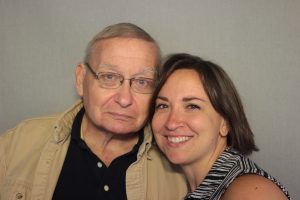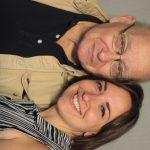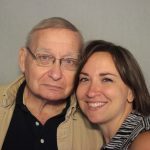Tom Kearns and Emily Kearns
Description
Tom Kearns (68) tells his daughter Emily Kearns (33) about his career as a carpenter and furniture maker, working for Ford Motor Company, living in Detroit after the 1967 rebellion, and his experience as a father.Subject Log / Time Code
Participants
- Tom Kearns
- Emily Kearns
Recording Locations
Detroit Institute of ArtsVenue / Recording Kit
Tier
Partnership
Partnership Type
OutreachKeywords
Subjects
Places
Transcript
StoryCorps uses Google Cloud Speech-to-Text and Natural Language API to provide machine-generated transcripts. Transcripts have not been checked for accuracy and may contain errors. Learn more about our FAQs through our Help Center or do not hesitate to get in touch with us if you have any questions.
00:03 My name is Tom Kearns. I'm 68 years old today and it's my birthday July 15th, 2017 in my home city hero of Detroit, Michigan.
00:18 And I'm not sitting here with my wonderful daughter Emily.
00:27 My name is Emily Kearns. I am 33 years old. That's July 15th 2017 in Detroit, Michigan, and I'm here with my dad Tom.
00:40 So, it's your birthday. Happy birthday. Dad Forex.
00:46 I guess just to start since it's your birthday. Do you want to tell me what you when you were a kid? What did you think your life would be like when you're older?
01:00 When I was a kid.
01:03 I guess so. I'll go back to
01:07 When I was in Middle School and in my high school years.
01:17 I grew up in Chicago for a while and some of the people that I got to know in the suburb were very influential. I'll make the very top the top 1% in America.
01:37 One of my friends dad's was the vice president of Latin American Affairs for Sears and Roebuck.
01:46 Then another guy that I knew was one of the heads of the Chicago Board of Trade and
01:55 So I was groomed at that point and I thought I would be a
02:01 A business person in America
02:05 What do you do now?
02:07 Well, I'm retired and I am a retired Carpenter cabinet maker educator.
02:19 Panda
02:22 I have a 1500 square foot woodworking furniture shop at my house. And so I build custom furniture part-time.
02:35 How did you decide to be a carpenter woodworker Furniture maker?
02:40 Well that came about in there. I had some.
02:49 Really?
02:52 Training when I was young.
02:55 For my father
02:58 In carpentry work
03:00 And
03:03 I like I said, I was originally Grooms to be a lawyer or a businessman or a professor.
03:10 But I ended up taking a different route because of being a activist in the 1960s and I decided to be part of the American working class and I took jobs working in factories and in the auto plants here in Detroit.
03:35 And I got wiped out of my auto job around 1980.
03:44 And so then I went and took training to a pup my skills and carpentry and became a carpenter and then proceeded to work as a carpenter independently and on my own for 6 years doing restoration work here in Detroit, and then I join the Carpenters Union and I got a job working for.
04:15 Bloomfield Hills Schools as a journeyman carpenter and then
04:23 That procedure to a a little bit different path and I are set up an adult education program to teach people.
04:34 How to build custom furniture
04:38 What do you think or do you think that working as a carpenter? Has that taught you anything about life?
04:49 Well, what are you taught me was and I didn't describe realtor was that I had to grandfather's one grandfather was a
05:00 Hey a Furniture maker in my other grandfather.
05:04 Make custom suits for men. He was like Taylor and so I had Craftsman in my jeans.
05:13 Panda
05:15 I didn't know this but when I was in Middle School, I took a little shop course, you know in middle school and I built a little shelf from the house and Shop teacher. I said to the shop teacher.
05:30 What do I do next sunesis what you need to make it smooth? And I said how smooth and he says will you make it as smooth as you want and I took about two weeks to sand it and send it to the Lowe's soak it so that was deep in my blood. And so then years later when I became a full-fledged Carpenter and took up Furniture work the idea of taking
05:55 Kris and turning them into Lumber and then turning them into beautiful Furniture was just the most incredibly satisfying thing in my life.
06:11 That's one of the things I always remember about being a kid and growing up in you know in your Woodshop with you and when you are whenever you were working on a piece of furniture is usually a table.
06:27 That that's how we knew it was done, you know was that you would go out and sand and sand and sand and sand and then you would take my hand and run it across the top of the table. I'll just always remember that feeling of like that glassy silky feeling off the wood when when the table was finally done.
06:50 Yeah, I taken many seminars from Master Woodworkers and I took one from a Austrian Master Furniture maker and he taught me this technique of closing your eyes and running your finger fingertips across the wood and let your fingertips.
07:13 Tell you if it was smooth them out and tell you where if there was any defects in the wood and soul your fingers became your eyes and you got a much closer relationship with the wood.
07:29 What's your favorite piece of furniture that you ever made?
07:33 Oh.
07:37 I think the the one that I like her best as I made a sofa table or a hall table, it's made out of black cherry and
07:48 All my furniture I try to have it be inspired by nature. And so this one in particular I was studying.
08:00 Photography of animals and I was able to take the up the shape of the legs of an antelope and then taken Carville legs on the piece of furniture. So they had that antelope shaped legs. And so the table as a pillow top cherry Hall table and when I say pillow top it's that I had the piece in the furniture show a woman ran her hand across the top and said oh this feels like a pillow
08:37 And it's what you get it and and then it has the antelope lakes. Also. All the edges are I've done on my furniture. All the edges on table tops are all done with hand tools block planes and scrapers. And so the edges are very subtle and they're like facets on a diamond ring so that when the light hits it the light glances off of the facets the edges and the subtleness grows with you. It's not the it's not gerrish like some modern art pieces.
09:21 You had said that your grandfather was a tailor. Do you have any favorite memories of him and being in his shop?
09:31 Yeah, this was in Buffalo New York. Then he had a tailor shop in a in a business district and it was a old storefront with big glass windows and he had a big long oak table work table that he sat at on the top of the table when he made the men's suits and
09:53 I lived upstairs in an apartment with my parents and I used to go downstairs. I was probably
10:01 Oh 3 or 4 years old and he would give me a needle and thread and some cloth and I ended up taking the Clausen and sewing it to my pant leg.
10:14 So that's one of my favorite pictures.
10:18 Cute
10:21 Don't talk about your parents or what it was like.
10:25 As a kid
10:30 You don't have to.
10:33 Dallas skip that how did you come to Detroit? Where'd you grow up? Then? When did you move to Detroit in Buffalo New York? My father was a master printer. He works for a company that printed time and Life magazine and. He'd worked at that company from when he got out of the Navy. You know, what war
11:06 Open Excel and and then in I believe in 1959. We were transferred to Chicago where they opened up another printing plant and I live there from 59 to 63 or 64 then then move back to Buffalo and then lived in Buffalo until 1977 when I came to Detroit and and got a job working at. Ford Motor Company building Mustangs on the line at the Ford Rouge Plant in Gill. What was that? Like?
11:44 It was the most intense work I've ever done in my life.
11:50 You taught me incredible respect for people that work in the auto plants.
11:56 The line was moving extremely fast. And so we were building anywhere from 56 to 72 cars an hour.
12:10 Until you had less than a minute to work on on each.
12:16 Car that came by you. What was your job in the paint department? And
12:26 I was kind of lucky because I got.
12:33 I was
12:36 Shepherd by the one of the men who is called a policeman and he did all the jobs on the line and he's the one who would come and give you a break. That's why I never stopped. And so then he trained me and I knew about 25 or 30 jobs on the line and so I was kind of his assistant. And so whenever there was somebody with Sara Gore had a vacation day or the relief man was off then I did really from its working and so by doing all the jobs in this one Department High then I got to know many many people and there was very rewarding
13:22 Anything else stick out to you the first time I walked in the plant.
13:30 I've never been in an assembly plant and I walked in and I saw the line in the line was just
13:39 It was so long and it was two or three hundred cars.
13:46 Down the line just like this huge amount of car bodies.
13:51 And everything was very fast and everybody was doing their part and so was the first time it was very very overwhelming.
14:05 And then you become part of it and the interesting thing about that is there were young guys who got hired in at the same time I did and because the work was so intense and so we're not missing so repetitive and so hot and we are working 10 hours a day 5 days a week and then every other Saturday 8 hours of your life was working the plan. That's what your life was about that if you didn't figure out how to fit in
14:43 The system would just drive you crazy and you have to leave.
14:47 So, how did you fit in well, I sit in by.
14:52 That was several things one trick voices that you never wore your wrist watch on your wrist because if you did you would look at the watch and you would see only that one minute that you changed and if you have 10 hours in front of you you cannot deal with it one minute at a time. So you put your wrist watch in your pocket.
15:13 And you don't look at it. That's 1/2 is you learn the job so well.
15:22 And you weren't from the old guys the easy way.
15:26 The best way so that you can do the job without even thinking it's just repetitive motion.
15:35 And then for me by knowing all the jobs and by knowing all these people I could have discussion with the person across the line from me and see different people every day. And so it made it so that it was interesting and real and it didn't destroy me.
15:59 Do you said you came here in 77 and what was it like in Detroit at that time Ten Years After the Rebellion for trevelyan?
16:13 And what was it like that thing that struck me when I came in 77 in the thing that strikes me today is that
16:25 The rebellion was
16:28 A rebellion of poor people
16:31 Against poverty
16:34 And against police brutality
16:37 In the Rebellion there were 7000 people arrested.
16:42 700 of those people were white people. It was not just a black people's rebellion. And so what struck struck me down and Strikes me today is that
16:53 It was a decision made by the people who run Detroit the people at the top.
17:00 Ford Motor Company Henry Ford, I mean Henry Ford Bill Ford people who run General Motors
17:10 The richest people in the country. It was a decision to punish the people of Detroit and that when I came here it was not one supermarket in the city of Detroit. There were no.
17:26 Little stores or anything and so in 77 Detroit was a wasteland and in essence.
17:36 2017 Detroit is still a wasteland except for this small amount which is taking place. So there's been a decision made in the last few years to revitalize to Center the Midtown area of Detroit, but it's just amazing. I was driving through one of the neighborhoods.
18:04 You have a blessed week.
18:06 And you could see four blocks of and blocks with the word. No houses at all. It was absolutely barren.
18:18 And so where do you have a city in America where you have, you know?
18:25 50 acres a hundred acres 200 Acres areas where there is no housing at all. Well, what do you think about the Redevelopment now?
18:38 I think the New Year's two aspects.
18:43 Do you have
18:44 The Redevelopment in Center in a court area. It is a Redevelopment based on.
18:58 A class of people it's based on people who work at Quicken Loans downtown on on on Highly Educated people who have good paying jobs. And so I recently heard the story, you know if your friend
19:20 What's up?
19:22 Her and her husband had bought a loft record of a million dollars in downtown Detroit.
19:31 And so because they're educated because they have good jobs they can afford it but
19:38 For working people
19:40 There's been no Renaissance. There's been no building of of area of factories or places where they can work and so weird. It's so it hasn't
19:57 It isn't come music developed. It hasn't been built so that it includes Working Class People in Detroit.
20:09 Would you tell me about?
20:12 The value that you place on being a part of the working class. Where did that come from? And what does that mean to you?
20:24 Well
20:27 There was an interesting dynamic in my family and my father is a side work for this printing company and he was a foreman and so he had Foreman.
20:40 Ideas, he had the idea to management, but then there were his brothers. And so the rest of his family my uncle's they were all industrial workers. They worked at Bethlehem Steel one uncle was a union representative in the plant where my father worked my other uncle worked in in Meatpacking. What are you butchered hogs in in and beef and so there's two parts to the family and
21:15 I guess one thing I ventrally realized when I was becoming an activist and I was growing up that.
21:24 I'm not the kind of person who could
21:28 Sitting in an office behind a desk
21:31 There are my needed to be reactive and the other part of it was I need to be productive. I need to be creative. And so the whole thing of eventually becoming a carpenter where I could see the fruits of my labor. This was very important for me and then eventually becoming a teacher or I could teach Furniture then I could take my craft and share it with other people. So these things became very satisfying in my life. So Hands-On work productive work and sharing of knowledge.
22:13 So I know what my life's been about.
22:17 You got really sick a couple years ago and you haven't been able to do the same kind of work. How how has that changed your life for your outlook on life to have more limitations on your physical abilities.
22:32 Oh, it's been the biggest challenge in my life, you know to be in the hospital and
22:44 They have a spinal surgery to be in the hospital for 10 months almost died three times.
22:51 I have these physical limitations where I can't.
22:57 P building Furniture, like I used to do that with my whole plan to retire in to go out in the shop and Go furniture. And so the physical limitations have been extremely hard and so to two
23:18 Then we Channel my energy I taken up artwork. I do palette knife painting with acrylic paints. And so it's something which I can do which is not as physically demanding is working with so wood and building furniture.
23:42 Has being sick changed you at all or has it taught you anything different about life.
23:53 Well one is it made me?
24:00 Find me value life in it.
24:04 If you looked at us in the face.
24:07 And if you also see other people that you know died.
24:12 That
24:14 When you're at that point that things like
24:21 How much money do you have the car do you drive? How big is your house these things mean? Nothing?
24:30 What is critical and what is key?
24:35 Is
24:38 You ask yourself these questions. What have I done?
24:42 In my life to make Society better.
24:46 What's my relationship been like with the people around me with you with my friends?
24:53 Get these are the questions that you ask.
24:57 When you're right at the end.
25:00 And so then you have a whole different attitude about life the other stuff doesn't mean
25:07 Anythink
25:09 But what's your advice to me, then about how to take those things to heart and how to be a good person.
25:18 My advice to you would be
25:22 2
25:25 He'll to make choices and to love.
25:29 To design on me a life, which is productive with make Society better.
25:40 Their life is extremely short.
25:44 And if we can help him change siding make it better that that's all we can ask for.
25:51 And that that's what fulfillment and happiness is about it's not about.
25:59 Do you smoke material things that I talked about earlier?
26:06 Do you remember the first time you saw me?
26:10 Oh, yeah. Yeah, I mean it was 1983 and you know.
26:20 We were at the hospital here in Detroit and your mom was about to give birth in and it has been a long labor and then you weren't coming out and in so they had to do a C-section.
26:37 And then so you only get all that cutting and then when you came out, you know, they are handed you to leave with usually and the baby over to Mom, but they handed you to me and then when they
26:56 I took Mom to the area where she had to be stitched up. I remember Rob the doctor giving me you and I put you on my chest and you know what I saying some little songs to you, you know.
27:17 And the band I could feel you. Are you are my heart beating on my chest was an incredibly on.
27:26 Powerful moment in my life
27:38 You know when saw the video that's the other thing is the year.
27:45 Thea Joy
27:50 Having a wonderful being that you are part of that you bring into the world.
27:57 It's another part of life, which is so so powerful and so much more important than material things to say to your teacher and guide this EBT being.
28:14 Into this world. It's an Incredible Gift that we have.
28:23 Did you know that you wanted to be a dad?
28:30 Did I know?
28:34 Yes. Yeah, and the thing is is that I was about 34 years old when you were born.
28:41 And I was ready 20 years old. I was not ready. And so I might advise as if you're a guy and you were in a relationship, wait a little bit waiting to your you made the choice that you're ready to be a dad and if that's your mission, it's not Sports.
29:05 What's the different than you thought it was going to be?
29:19 Who's in the adventure and the part of it for me was because I had you know, many friends that had kids I could sit back and
29:29 And watch their parenting of kids and then make choices with how I wanted to be a dad.
29:38 Same problems that they had and wanting to do things in a more positive way.
29:47 What was the hardest thing about raising kids?
29:56 The hardest thing
30:02 I guess the
30:05 The hardest thing to be extremely honest is that you know you were about
30:10 You know, I don't know 5 or 6 or in that area when her marriage fell apart and then the hardest thing was how to
30:24 How to be a dad and how to
30:27 Workout
30:29 Just minor differences in child-raising without it becoming a major crisis.
30:39 That dog
30:41 That was another thing I drink for my friends who fought for your kids and how it not only destroyed them, but it destroyed their kids.
30:52 And solder the thing is is that
30:56 The idea is that
31:01 You have to respect the other person.
31:04 In the relationship
31:06 And
31:08 You just can't get your way. All the time doesn't work that way.
31:19 The two people are different people have different attitudes different methods. And so then the question is, how do you
31:27 How do you work that out?
31:30 Without it becoming you know of tension or conflict.
31:39 So that was a big thing or not for me.
31:46 What do you dream about for me for my future?
31:51 Well, I guess the big dream is that you've made this decision, you know too well that you would like to be a doctor.
32:02 And so my dream is that
32:10 But you can use your skills and use your
32:17 Kindness
32:19 To help society and help people on the medical answer for front.
32:27 Medicine is too tight.
32:32 Everybody is so
32:36 He has given opportunities and then the question is can you make the most out of those opportunities?
32:53 Is there something about me that you've always wanted to know but you've never asked?
33:02 I guess this thing I would go, you know, we're on their front.
33:12 You know, you're an idiot, you know, you're married you're in a same-sex relationship. And so I guess the thing I've never asked is the evolution is taking place in your life and
33:28 How you decided in your past? You know that you are a gay woman?
33:38 That's a big question.
33:43 I don't know. I don't know.
33:49 I don't know if I decided.
33:58 Yeah, I don't know. I I I
34:01 I just am.
34:06 I think it was more of a matter of
34:11 Feeling like it was okay, and I liked it was going to be
34:20 Like it would be all right for you.
34:33 It was important to you accepted by your mom and myself.
34:49 Yeah.
34:52 Yeah, it's a scary thing Even in our family where?
35:01 You guys were so accepting an open and loving everyone else, but I needed to know that.
35:09 That same acceptance would be extended to me. I don't know. It's so weird. It's so weird to feel like
35:18 Scared that
35:21 You guys would have been upset.
35:31 Yeah, and it all has to do with pressure.
35:35 In society
35:37 Judgment of what Society deems as acceptable right all those morals moral judgments
36:05 I guess so.
36:07 I mean the other thing is so
36:15 These are
36:20 These are things that go.
36:26 Ovarian
36:30 I went through things where I wasn't accepted by my parents and I had to fight for who I am and what I am.
36:39 And so
36:41 Knowing that fight
36:44 Even though it was different, but it was similar.
36:49 The idea of accepted girl
36:53 Shoulders for who they are and what they are.
36:57 Bet experience very important.
37:06 And you don't have the right to decide what someone for someone else's life is going to be.
37:13 You're not you are not my property.
37:19 Old feudal times
37:23 You know women would have been property.
37:28 You don't just like black people were property.
37:36 Are you proud of me today?
37:38 Oh, yeah, I'm critically proud of you cuz I mean
37:43 You've had
37:46 New challenges that you've had to overcome and you've done that and and so
37:57 Pride comes up on this way of a
38:04 Private I've seen you become an adult and you're right very capable.
38:12 Organized adult woman and so to see your child grow up and become an adult there's it's not necessarily what job did he have from what school they went to wear anything else with the fact that you've become an adult and
38:33 You know that's important thing.
38:37 And so I feel satisfaction. I feel Pride I feel.
38:44 I Feel Love relieved, you know
38:51 I'm proud of you, too.
38:53 Thanks.
38:56 Thanks for talking with me today.
38:59 I was surprised I didn't know this was going to happen.
39:04 Happy birthday.
39:08 Good birthday.






